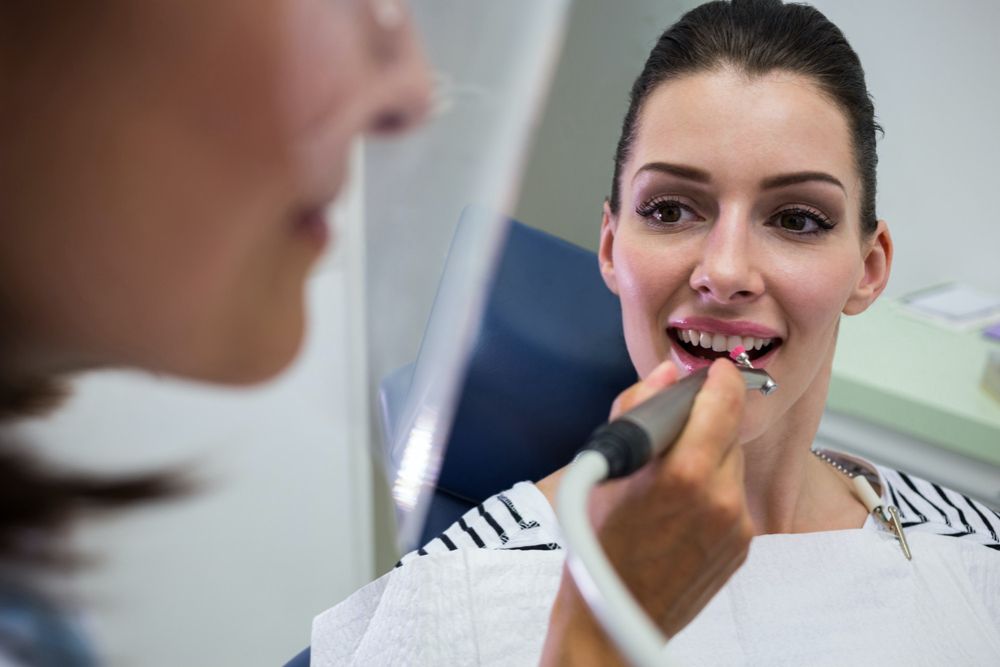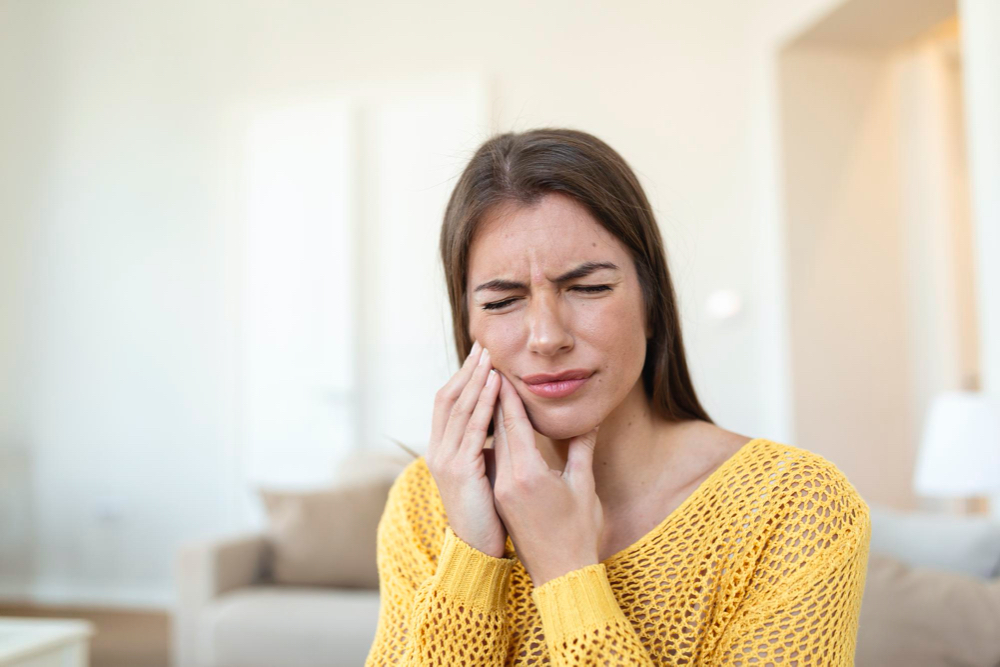- Fast results
- 4,000+ locations
- 4.8 star rating
Need Help? (888) GET LABS



When you have gum swelling, you can use natural remedies to relieve the pain–often with items readily available at home. However, you may have to visit your dentist to uncover any underlying cause, especially if the swelling does not subside in two weeks. Nonetheless, check out these science-backed home remedies for swollen gums to help you go on with your day.
Salt water solution is an excellent home remedy for gum swelling due to its efficacy and practicality. This mechanism was shown in a 2021 analysis of the effectiveness of salt water mouth rinse compared to chlorhexidine when treating inflammation after a minimal periodontal surgery. The study concluded that salt water solution can be as efficient as the antiseptic chlorhexidine in managing infections and preventing gum swelling.
As salt water can kill off bacteria by causing a significant imbalance in the microbe’s water retention, it’s no surprise that it can relieve the painful and swollen gums caused by infections.
To prepare the salt water mix, add one teaspoon of salt to eight ounces of water. Mix it well until the salt is dissolved. Gargle the solution for 15 to 30 seconds and spit it out. You can repeat the process three times a day, but avoid doing it a few times more.
A cold compress reduces blood flow in the swollen area, which, in turn, tones down the inflammation. This helps numb the pain and relieve swelling in your gums, as it also suspends nerve activity temporarily.
Make sure to place the ice bag on the inflamed area on your face for about 20 minutes. Do this three times a day to gradually minimize the swell.
Regular mouthwash and alcohol both contain ingredients that can irritate the inflamed gum. While it’s sometimes instinctive to rinse with mouthwash, remember not to do it if you want to avoid aggravating the swollen gums. One exception, however, is if you’re using medicated mouthwash designed for treating gingivitis, which causes swelling.
Aloe vera contains antiseptic and anti-inflammatory properties and is safe to relieve gum swelling and plaque-induced gingivitis. You can apply the aloe vera gel from the leaf to the affected gum area. You can also mix a handful of aloe gel with a glass of water and use it as a mouthwash.
Water can help reduce gum inflammation. It does so by flushing away bacteria and acids that cause tooth decay and gingivitis. Additionally, water improves saliva production, which is crucial for fighting gum infections and maintaining gum health.
Staying hydrated also prevents dry mouth, which contributes to gum disease. Drinking water benefits oral health by cleaning the teeth, strengthening enamel, and preventing bad breath.
Sweets and candy contain high amounts of sugar, which allows bacteria to proliferate, leading to gum disease and inflammation, which worsens the swelling. In this sense, avoiding sweets can reduce bacterial buildup in your mouth and promote better oral health. Instead, opt for less chewy yet healthier alternatives, like green veggies, dairy, and easily digestible whole grains.
Inflammation of the gums can be triggered or worsened by the texture of the food you eat. To avoid aggravating the condition, stir clear from popcorn, beef tenders, mango, corn kernels, seed snacks, and other foods that can cling to the crevices and spaces between your teeth. Go for alternatives that don’t require a lot of chewing, at least until the swelling wears off.

If gum inflammation hasn’t subsided in days despite the remedies above, make sure to schedule a dental checkup appointment. Do the same if the condition recurs.
Swollen gums triggered by food lodged in your teeth should go away after clearance. If the swelling persists after a couple of weeks, seeing a healthcare provider will secure the right treatment. Of course, this will be based on what’s triggering the gum swelling.
The following are common causes of swollen gums:
Gingivitis is the inflammation of the gingiva, the part of the gums surrounding the base of the teeth. The condition is classified as mild periodontal disease, an advanced gum disease that can lead to teeth loss. Gingivitis typically results from poor oral hygiene, promoting bacterial growth and plaque buildup.
| Did You Know? Periodontal disease leads to elevated CRP levels. While a CRP blood test is often associated with heart health conditions, it can also help confirm periodontitis as the condition triggers systemic inflammation. Learn how you can naturally lower your CRP levels from our guide. |
Certain vitamins prove to influence dental health, specifically susceptibility to gingivitis. For example, a study published in the International Journal of Clinical Pediatric Dentistry underscored the connection between low vitamin B12 among children and their risk of developing gingival disease.
In addition, increasing vitamin C intake has been shown to mitigate bleeding due to gingivitis and contributes to the prevention of gum disease. Plus, vitamin C also helps strengthen immunity against infections that cause gum inflammation.
The rise and fall of reproductive hormones, specifically estrogen and progesterone, can impact blood supply in the periodontal region. This can increase the risk of plaque buildup and, in turn, infections. As a result, you will be more prone to gum swelling at certain stages in your reproductive cycle and related conditions.
For example, you may find more gum swells during pregnancy, menstruation, puberty, or when you’re hitting menopause. Among those already with gingivitis, the swelling may exacerbate along with redness and pain during these periods.
| Pro tip: Aside from swollen gums, menopause brings other types of physical discomfort. Find out how to prepare your body for menopause, including the best time to start getting ready. |
Swollen gums can be attributed to irritants that can cause temporary inflammation or minor tissue damage. Some examples of irritants include tobacco, spicy food, frozen treats, and alcohol.
In some cases, the main cause of gingivitis can be other health conditions, such as an autoimmune disease. This is why it’s best to consult your dentist or doctor to diagnose the underlying cause and secure the proper treatment for the inflammation.

Gingivitis often results from poor dental hygiene and lifestyle choices that can aggravate gum inflammation. That said, the best way to prevent gum pain and swelling is to do the following actions.
Most dentists are adamant that you should brush your teeth twice a day. Once in the morning, remove bacterial growth while sleeping and before you go to bed. Toothbrushing using fluoride toothpaste is the simplest and most important measure to prevent plaque buildup that promotes infection.
Smoking cigarettes or tobacco can cause increased tartar buildup in the teeth. Tartar or hardened plaque comes from bacterial accumulation, encouraged by decreased saliva production when a person smokes. Plus, tobacco also causes yellow staining on the teeth and nicotine deposits that further damage the gums.
| Pro tip: It’s no secret that giving up smoking can drastically improve your well-being, including your dental health. However, the process of withdrawing can be a challenge on its own. Hence, make sure to avoid the common mistakes when quitting smoking. |
Much like your annual visit to your primary care provider, setting an oral health checkup at least once a year is an effective way to prevent debilitating ailments from developing. Some dentists even suggest visiting a dental clinic twice a year. For a more informed decision, ask your dentist for the recommended consultation frequency based on your health profile.
The quality of your brushing is as important as how often you do it. Dentists recommend brushing your teeth gently with a soft-bristled toothbrush to avoid wearing down the tooth enamel. Also, this type of toothbrush is safer for the gums as it is less abrasive.
Given the role of nutrients, particularly vitamins B12 and C, in protecting your gums from infections, it’s only sensible to add vitamin-rich foods to your diet. These include citrus fruits, cruciferous vegetables, dairy, fish, and leafy greens. Check our guide on the best food sources for vitamin C and folates, especially for pregnant women.
While these steps can help protect you from gingivitis, certain conditions may require additional actions to completely prevent recurring gum swelling around the teeth. Consult your dentist to better understand the best measures to optimize your periodontal health.

The severity of gum swelling depends heavily on its cause. However, the rule of thumb is if the inflammation continues for a week or the pain persists for days, you should visit your dentist or doctor immediately. Even if the actual cause of the swollen gums is a mild condition like gingivitis, it can worsen and develop into a much more serious periodontal disease if not treated promptly.
With treatment, gum inflammation should subside in less than a week. However, this depends on what’s causing the inflammation and its severity. If there’s no improvement from the swelling after taking the prescribed medication and employing natural remedies to supplement the treatment, inform your dentist or periodontist right away.
Mouthwash does not cure swollen gums. In fact, rinsing your mouth with mouthwash when your gums are inflamed can cause further irritation. You can, instead, use a saltwater solution as it is far gentler and safer for the affected tissue.
Turning to a natural remedy for swollen gums can help alleviate the pain and discomfort. However, you can only ensure complete healing with the guidance of your healthcare provider. Hence, even if the swelling subsides, don’t neglect your regular dental checkups to uncover underlying issues that trigger the gum inflammation.

© Copyright 2025 Personalabs. All Rights Reserved.